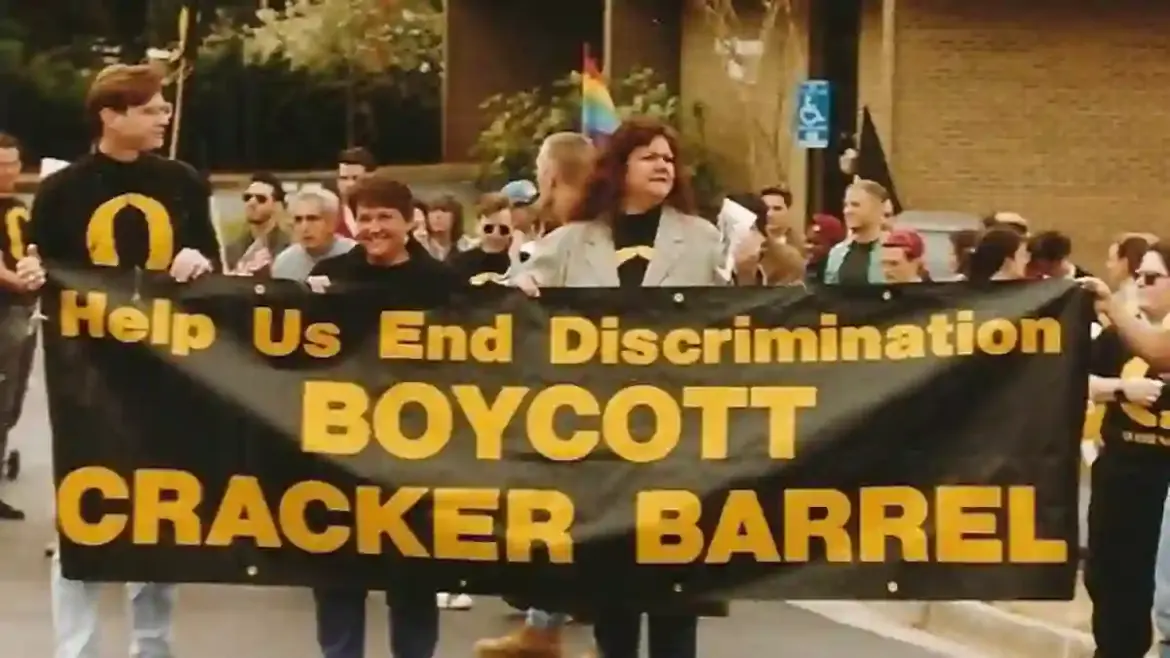Cracker Barrel has always been more than just a roadside stop for cornbread, rocking chairs, and comfort food.
It’s a place that represents a certain version of Southern Americana.
But lately, the chain has been in the headlines for all the wrong reasons—first for a controversial logo redesign, then for a sudden backtrack after conservative backlash.
What many may not realize, though, is that this isn’t the first time Cracker Barrel has been caught up in controversy.
For people like Cheryl Summerville, the company’s return to its “old-fashioned image” feels like a chilling reminder of a painful past.
A Cook Fired for Being Gay
Back in the 1990s, Cheryl was working as a cook at a Cracker Barrel in Douglasville, Georgia.
One day, she was handed a blunt termination notice that simply read: “The employee is Gay.”
She was one of eleven workers fired for what the company at the time described as “failing to demonstrate normal heterosexual values.”
“They decided that if you were gay you weren’t welcome,” Cheryl, now 67, told the Daily Mail. “There was a lot of discrimination.
They even sold rebel hats and mammy dolls. Is that really what people want to bring back?”
A Long History of Discrimination
Cracker Barrel didn’t formally add sexual orientation to its non-discrimination policy until 2002. But before then, its track record was troubling.
In 2004, the chain settled a lawsuit with the Department of Justice after accusations that Black customers had been refused service, subjected to racial slurs, forced into segregated seating, and even served food that came from the trash.
The company paid $8.7 million to settle the claims.
For Cheryl, though, her firing was deeply personal. She grew up openly gay in Georgia and hadn’t experienced such blatant homophobia until Cracker Barrel. “I actually worked with a couple of lesbians,” she recalled.
“But when I admitted I wasn’t heterosexual, they said they had to fire me too.”
Fighting Back Through Protest
Cheryl didn’t take her dismissal quietly. With her partner, Sandra Riley, she teamed up with activists from Queer Nation to organize peaceful protests across Georgia.
Their tactics were simple but effective—ordering a coffee, sitting quietly for hours, and leaving generous tips for staff to make a point without causing disruption.
Her activism landed her in handcuffs more than once, but juries repeatedly found her not guilty of trespassing.
Over time, the protests grew in size and gained media attention.
Cheryl found herself speaking on national platforms, appearing on Oprah and Larry King Live, and even testifying before Congress in 1994.
Taking the Battle to the Boardroom
Activists eventually took their fight directly to Cracker Barrel’s shareholders.
Through a campaign known as Buy One, protesters bought individual shares in the company to gain access to shareholder meetings.
While their ownership was minimal, it gave them just enough power to be heard.
By 2002, their persistence paid off: shareholders voted to amend the company’s equal employment policy to include sexual orientation.
Still, Cheryl never received an apology, nor was she reinstated.
The National Shift Comes Decades Later
It wasn’t until 2020—nearly three decades after Cheryl was fired—that the U.S. Supreme Court ruled it illegal under the Civil Rights Act to fire someone for being gay.
By then, Cracker Barrel’s history of discrimination was already well-documented, and the scars left behind for workers like Cheryl remained.
A Return to “Old Values”
Fast forward to 2025, and Cracker Barrel once again finds itself caught in cultural crossfire.
After unveiling a modern logo that ditched its longtime mascot, Uncle Herschel, the company faced a storm of conservative criticism.
The backlash tanked the company’s stock value by nearly $100 million and forced leaders into a quick retreat.
“Our new logo is going away and our ‘Old Timer’ will remain,” the chain announced, bowing to the pressure.
Mixed Messages on LGBTQ+ Support
But for Cheryl, what was even more troubling than the logo fiasco was the quiet removal of LGBTQ+ content from Cracker Barrel’s website—including a Pride section and references to an internal LGBTQ+ employee group.
A spokesperson later brushed it off as an update to “out-of-date content,” but Cheryl wasn’t convinced.
“They are cowards,” she said bluntly. “They just do whatever they think will appease people, not because it’s the right thing to do.”
Looking Back and Speaking Out
Now 67, Cheryl has lived through decades of cultural change, from the AIDS epidemic to nationwide battles for equality.
Yet she says today’s political climate, emboldened by figures like Donald Trump, has opened the door for old prejudices to resurface.
“After so much progress, we are suddenly taking a step backwards and it’s so sad to see,” she reflected.
“I think there have always been people who felt this way, but I’m afraid that Trump has given them the permission they needed. I’ve never seen so much hatred in my life.”
The Bigger Question
For Cheryl, the issue goes beyond Cracker Barrel’s logo or even its corporate policies.
It’s about whether America is willing to move forward or risk sliding back into an era where discrimination was openly tolerated.
“The right to hold a job shouldn’t depend on whether you’re Black or white, male or female, gay or straight,” she once told Congress.
Three decades later, that same belief still drives her voice.
